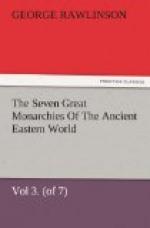From these names of persons we may pass to those of places in Media, which equally admit of explanation from roots known to have existed either in Zend or in old Persian. Of these, Ecbatana, Bagistana, and Aspadana may be taken as convenient specimens. Ecbatana (or Agbatana), according to the orthography of the older Greeks was in the native dialect Hagmatana, as appears from the Behistun inscription. This form, Hagmatana, is in all probability derived from the three words ham, “with” (Sans, sam, Latin cum), gam, “to go” (Zend gd, Sans, ’gam), and ctana (Mod. Pers. -stan) “a place.” The initial ham has dropped the m and become ha, and cum becomes co- in Latin; gam has become gma by metathesis; and gtan has passed into -tan by phonetic corruption. Ha-gma-tana would be “the place for assembly,” or for “coming together” (Lat. comitium); the place, i.e., where the tribes met, and where, consequently, the capital grew up.
Bagistan, which was “a hill sacred to Jupiter” according to Diodorus, is clearly a name corresponding to the Beth-el of the Hebrews and the Allahabad of the Mahometans. It is simply “the house, or place, of God”—from baga, “God,” and gtana, “place, abode,” the common modern Persian terminal (compare Farsi-stan, Khuzi-stan, Afghani-stan, Belochi-stan, Hindu-stan, etc.), which has here not suffered any corruption.
Aspadana contains certainly as its first element the root acpa, “horse.” The suffix dan may perhaps be a corruption of ctana, analogous to that which has produced Hama-dan from Hagma-ctan; or it may be a contracted form of danhu, or dairihu, “a-province,” Aspadana having been originally the name of a district where horses were bred, and having thence become the name of its chief town.
The Median words known to us, other than names of persons or places, are confined to some three or four. Herodotus tells us that the Median word for “dog” was spaka; Xenophon implies, if he does not expressly state, that the native name for the famous Median robe was candys; Nicolas of Damascus informs us that the Median couriers were called Angari; and Hesychius says that the artabe was a Median measure. The last-named writer also states that artades and devas were Magian words, which perhaps implies that they were common to the Medes with the Persians. Here, again, the evidence, such as it is, favors a close connection between the languages of Media and Persia.




